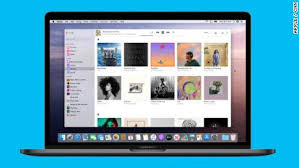This column originally appeared in the Chicago Tribune June 11, 2019
Back in Sept. 2014, I opened my Apple iTunes application one morning only to find U2 ‘s new album, Songs of Innocence, was now part of my music collection. I hadn’t purchased the album, hadn’t listened to any tracks prior to its appearance, hadn’t even tried to contact Bono via social media to ask when the band was releasing new music. Note: I have done the latter with other artists; I’m still waiting for Bruce Springsteen to respond.
No, the album just APPEARED. And I wasn’t special. Apple attached it to iTunes accounts by default, meaning millions of users who, like me, store their music on iTunes, now had 11 more songs in their catalogues. The experiment proved two points:
1. Songs of Innocence kind of sucked.
2. Apple can control anybody’s iTunes account.
Which is why I’m positively terrified of Apple’s recent announcement to phase out iTunes on Catalina, its upcoming operating system. In short, the company is killing iTunes. And I am imploring Apple to reconsider.
Despite Apple’s assurances that my 4,057-song library is safe and will simply “migrate” to the new Apple Music app, I’m beyond skeptical. If Apple can randomly make music appear, it can certainly make it disappear as well. For all I know, Bono is probably on the phone with Tim Cook right now, wondering if the Apple CEO can casually delete all my music because I just dissed Songs of Innocence.
Apple, I’m warning you, if anything happens to my music collection, you will not just be stealing tunes. You will be taking away my youth, my favorite marital memories and my relationships with my children. Sound overly dramatic? Let’s examine my iTunes library, shall we?
Back in 2001, when iTunes debuted, I began the cumbersome task of digitizing my entire music collection so I could listen to it on a first-generation iPod. That meant loading every CD into my computer’s disc drive, one at a time, and waiting for the transfer process to complete.
I loaded music from bands that defined my high school and college years into iTunes. I also loaded music I was too embarrassed to admit I listened to in high school. Yes, I briefly went through a John Denver phase, followed immediately by a Molly Hatchet phase. Surprisingly, I did not take drugs in high school. Once I was certain the music was safe in iTunes forever, I took the CDs to secondhand music stores and sold them. Hey, it beat selling pints of blood.
My point is, those CDs are gone forever. Now, when friends of a similar age drop by to visit and we reminisce about our favorite 1970s-era bands, I simply open iTunes and, with one tap, we are catapulted back to high school prom, where we gyrated to REO Speedwagon’s, Roll With the Changes and held our dates close as Journey’s, Faithfully wrapped up the evening.
For our first dance as a married couple, my wife and I chose the Linda Ronstadt/Aaron Neville duet, All My Life. Every Nov. 27 since, I’ve fired up iTunes and we’ve repeated the dance, even during years when it was interrupted by the sounds of crying babies.
As those babies grew into teenagers, they introduced me to new bands and musical genres, suggesting I give a listen to Kanye West, The Chainsmokers and X Ambassadors. All three have made it onto the iTunes playlists I’ve created for the gym. My girls haven’t reciprocated by purchasing any John Denver songs, but my eldest vaguely recalls how I used to sing Sunshine On My Shoulders to her following bath time.
Apple, now you see why I don’t want to risk losing a single tune? Heck, I sweat profusely every time I upgrade to a new version of iTunes even though I have (allegedly) backed up my music. I don’t want to be on the phone with an Apple tech, wondering if he or she can help me locate Simon and Garfunkel’s Greatest Hits.
Please keep iTunes. In return, I will admit my iTunes library contains 42 Barry Manilow songs.




The F-Bomb Has Gone Mainstream — And Nobody Cares Anymore